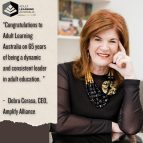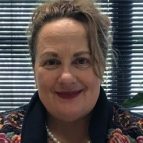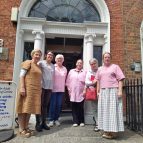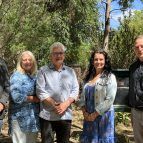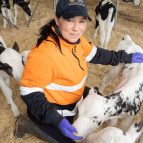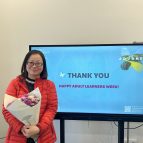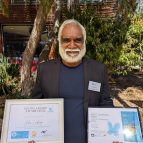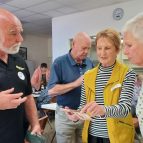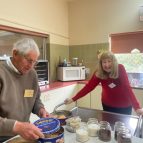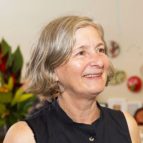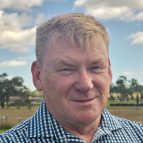Celebrating women’s learning
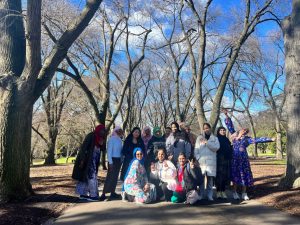 Women of all ages and backgrounds come from across Melbourne, including many from outer suburbs, to be part of the community being built by the River Nile Learning Centre (RNLC) in a welcoming and engaging inner north office building.
Women of all ages and backgrounds come from across Melbourne, including many from outer suburbs, to be part of the community being built by the River Nile Learning Centre (RNLC) in a welcoming and engaging inner north office building.
Some have recently arrived in Australia, including individuals from detention on Nauru and Christmas Island. Many live in community detention or face government limitations on their rights to study, hindering their access to mainstream adult education.
The River Nile Learning Centre opened its doors in January 2017 to provide education programs and services to young refugee and asylum seeker women. The Centre’s goal is to equip women with the language and life skills that help build confidence, encourage them to continue their education, seek employment, and become more involved in their communities.
The ages of participants range from women in their early 20s to their mid-60s, with the largest cohort being women in their mid to late 30s, many of whom have young children. Some study for a few months to a year, while others have been attending the centre for several years. Free, pre-accredited foundation English, digital, and numeracy classes are run flexibly and tailored to the students’ capacities by the Centre’s three teachers. Working in partnership with the nearby North Melbourne Language Centre, the RNLC was able to introduce an additional English class for higher-level students in 2023.
Becoming one of the Centre’s three paid staff members in early 2022, Engagement Coordinator Rahel Davies quickly learned — as many in the adult learning sector will attest — that ‘you can’t just offer a course and expect people to turn up’.
‘I used to have to call students to check if they were okay and encourage them to come in again. Then I realised we had to do more than just offer classes— we had to make the women feel that we were more of a community rather than just here to teach them English or literacy.’
This included regularly checking in with at-risk students, as well as sending out updates and information about the program and upcoming events via WhatsApp.
Excursions became an important part of each term, providing students with the opportunity to explore different parts of Melbourne, practice their English in a practical setting, and form friendships. Visits have included museums and galleries, tourist attractions, beaches, and gardens.
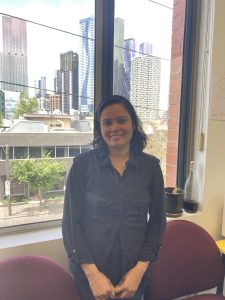
Student Tabussum started attending the Centre in early 2023 after hearing about the Centre’s English classes from another organisation. Tabussum is now fully involved with maths, English, and computer classes and loves the help she gets from teachers Apeksha, Louise, and Robert.
When asked why she likes coming to the Centre, Tabussum said that it is a ‘big and important question, because before I had no confidence and I felt hopeless’.
`After I came here, I forgot everything about my hard life. I like that it is all women, this is very good, and the teachers are great, everyone is helpful and kind. It is very good for women to learn English and to come and find happiness here. When I go home its boring for me, so I love coming to school. And I am very happy and very proud,’ Tabussum said.
With no recurrent funding, all River Nile programs depend on grants and donations. Rahel quickly became aware that this meant building strong relations with existing and prospective donors. ‘We send them lots of reports and photos, but I also invite them to join us here for lunch. Most of the women love cooking, and the donors love sitting down and chatting with them over food’, she said.
Funding now enables the Centre to offer students free driving lessons, monthly Myki passes to attend classes, women-only swimming lessons, and workshops and information sessions on topics such as health. Students can also access a food bank at the Centre, which has become considerably more stretched in recent months.
Tabussum says that what the Centre does in addition to education and training is provide a lifeline for many during the current cost-of-living situation. `Outside, everything is very expensive, so the food bank and free driving lessons are crucial. We are all struggling because everything is very expensive, so free services are especially important, especially for women.’
Funding also enables the Learning Centre to employ a social worker, who, Rahel says, fulfils probably the most important role we have here. `We have so many women here who have suffered great trauma, including family violence, and massive uncertainty. Our social worker helps them deal with things like bureaucracy, citizenship applications, and the digital literacy they need to do things like enrol their kids in school, pay fines, and avoid scams.’
‘These are the things that are beyond our scope as an education provider, but there is so much going on in the lives of most of our women to stop them from accessing education. With many of the women’s access restricted by their visas, we are the only place that some of them can come to’, she said.
Rahel believes the flexibility of the adult learning programs is another key reason why the women come to the River Nile. ‘We can’t run like a school and say that people have to be here for every class because most just can’t do that. We also have to check in regularly, however, with the ones not coming in to make sure they don’t feel forgotten either.’
The success of the work of Rahel and staff and volunteers to attract and retain students has led to 65 students now being enrolled. The Centre has the capacity for 80 students, and Rahel is hoping to reach that number this year.
Staff and volunteers at the River Nile Learning Centre celebrated two key milestones at the end of last year, which they are confident will underpin the ongoing effectiveness of the Centre for a long time to come.
In partnership with the Royal Melbourne Institute of Technology (RMIT), the Centre held its first-ever Careers Week in early December 2023– its biggest program to date – with activities including a presentation by William Angliss Institute, a visit to the Melbourne College of Hair and Beauty, and a fabulous lunch and graduation party. Rahel said it was a huge success.
The Centre then wrapped up the year by winning the Victorian Multicultural Award for Excellence in Vocational Education and Training (pre-accredited community-based training). These annual awards recognise organisations that foster cross-cultural understanding and support people from migrant, refugee, and asylum seeker backgrounds to ‘fully participate in all aspects of Victorian life’.
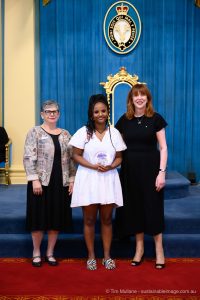
Visit the River Nile Learning Centre website for more information.

